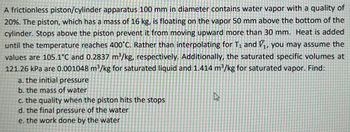
Elements Of Electromagnetics
7th Edition
ISBN: 9780190698614
Author: Sadiku, Matthew N. O.
Publisher: Oxford University Press
expand_more
expand_more
format_list_bulleted
Concept explainers
Question

Transcribed Image Text:A frictionless piston/cylinder apparatus 100 mm in diameter contains water vapor with a quality of
20%. The piston, which has a mass of 16 kg, is floating on the vapor 50 mm above the bottom of the
cylinder. Stops above the piston prevent it from moving upward more than 30 mm. Heat is added
until the temperature reaches 400°C. Rather than interpolating for T₁ and ₁, you may assume the
values are 105.1°C and 0.2837 m³/kg, respectively. Additionally, the saturated specific volumes at
121.26 kPa are 0.001048 m³/kg for saturated liquid and 1.414 m³/kg for saturated vapor. Find:
a. the initial pressure
b. the mass of water
c. the quality when the piston hits the stops
d. the final pressure of the water
e. the work done by the water
2
Expert Solution
This question has been solved!
Explore an expertly crafted, step-by-step solution for a thorough understanding of key concepts.
This is a popular solution
Trending nowThis is a popular solution!
Step by stepSolved in 4 steps with 4 images

Knowledge Booster
Learn more about
Need a deep-dive on the concept behind this application? Look no further. Learn more about this topic, mechanical-engineering and related others by exploring similar questions and additional content below.Similar questions
- Six grams of helium(4.0026 g/mol) undergoes an Isothermal process at 127 Celsius, beginning at 6 atm. Their container was found to be 0.04 meters under cube after the expansion. Assuming that helium unit is an ideal gas, calculate the amount of keep that flowed into or out of the helium during the process.arrow_forwardAn oxygen tank has a volume of V = 3.00 m3. The gage pressure of oxygen in the tank is Pgage = 400.00 kPa. The room temperature is T = 27.00 ˚C and the atmospheric pressure is Patm = 100.00 kpa. The gas constant of oxygen is R = 0.25980 kPa/(kg·K). Oxygen can be treated as an ideal gas. Determine (2) the mass of oxygen, m =_____ kgarrow_forwardThe previous one wasn't accurate ,I need right solution. Don't provide wrong solution ,Explain Where you get those values ( Include Table Number) #Urgentarrow_forward
Recommended textbooks for you
 Elements Of ElectromagneticsMechanical EngineeringISBN:9780190698614Author:Sadiku, Matthew N. O.Publisher:Oxford University Press
Elements Of ElectromagneticsMechanical EngineeringISBN:9780190698614Author:Sadiku, Matthew N. O.Publisher:Oxford University Press Mechanics of Materials (10th Edition)Mechanical EngineeringISBN:9780134319650Author:Russell C. HibbelerPublisher:PEARSON
Mechanics of Materials (10th Edition)Mechanical EngineeringISBN:9780134319650Author:Russell C. HibbelerPublisher:PEARSON Thermodynamics: An Engineering ApproachMechanical EngineeringISBN:9781259822674Author:Yunus A. Cengel Dr., Michael A. BolesPublisher:McGraw-Hill Education
Thermodynamics: An Engineering ApproachMechanical EngineeringISBN:9781259822674Author:Yunus A. Cengel Dr., Michael A. BolesPublisher:McGraw-Hill Education Control Systems EngineeringMechanical EngineeringISBN:9781118170519Author:Norman S. NisePublisher:WILEY
Control Systems EngineeringMechanical EngineeringISBN:9781118170519Author:Norman S. NisePublisher:WILEY Mechanics of Materials (MindTap Course List)Mechanical EngineeringISBN:9781337093347Author:Barry J. Goodno, James M. GerePublisher:Cengage Learning
Mechanics of Materials (MindTap Course List)Mechanical EngineeringISBN:9781337093347Author:Barry J. Goodno, James M. GerePublisher:Cengage Learning Engineering Mechanics: StaticsMechanical EngineeringISBN:9781118807330Author:James L. Meriam, L. G. Kraige, J. N. BoltonPublisher:WILEY
Engineering Mechanics: StaticsMechanical EngineeringISBN:9781118807330Author:James L. Meriam, L. G. Kraige, J. N. BoltonPublisher:WILEY

Elements Of Electromagnetics
Mechanical Engineering
ISBN:9780190698614
Author:Sadiku, Matthew N. O.
Publisher:Oxford University Press

Mechanics of Materials (10th Edition)
Mechanical Engineering
ISBN:9780134319650
Author:Russell C. Hibbeler
Publisher:PEARSON

Thermodynamics: An Engineering Approach
Mechanical Engineering
ISBN:9781259822674
Author:Yunus A. Cengel Dr., Michael A. Boles
Publisher:McGraw-Hill Education

Control Systems Engineering
Mechanical Engineering
ISBN:9781118170519
Author:Norman S. Nise
Publisher:WILEY

Mechanics of Materials (MindTap Course List)
Mechanical Engineering
ISBN:9781337093347
Author:Barry J. Goodno, James M. Gere
Publisher:Cengage Learning

Engineering Mechanics: Statics
Mechanical Engineering
ISBN:9781118807330
Author:James L. Meriam, L. G. Kraige, J. N. Bolton
Publisher:WILEY